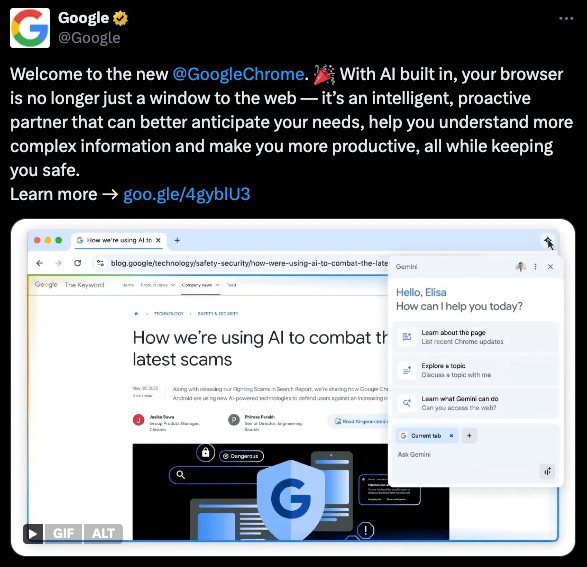Hello AI Enthusiast,
This week feels like a turning point for how we'll actually use AI in our daily lives. Google put Gemini directly into Chrome and launched a payment protocol so AI can buy stuff for you. Meta unveiled smart glasses with AR displays and neural wristbands that read muscle movements. The future just got more hands-on.
The Big Picture 🔊
Google Integrates Gemini AI Across Chrome Browser
Google launched what it calls Chrome's biggest update ever, integrating Gemini AI throughout the browser. Starting with US desktop users, the update lets you ask Gemini to explain complex webpages, compare information across multiple tabs, and handle repetitive tasks like booking appointments. The rollout also includes AI-powered scam detection, smarter notification filtering, and one-click password changes for compromised accounts.
Chrome putting AI directly into the browser makes sense, no more switching between tabs and ChatGPT. But having AI tools and knowing how to use them effectively are different challenges. Our Corporate AI Training helps teams figure out which tasks actually benefit from AI versus which ones create more work.
Google Launches Agent Payments Protocol for AI Commerce
Google didn't stop there, it also launched the Agent Payments Protocol (AP2) to help its Gemini-powered agents make purchases for you. Working with over 60 companies including PayPal and Mastercard, the system uses cryptographically-signed "mandates" to verify you actually authorized a purchase, whether you're shopping in real-time or delegating tasks like buying concert tickets when they go on sale.
Meta Launches Three New AI Smart Glasses
Meta unveiled three new smart glasses models, headlined by the Ray-Ban Display - the first mainstream smart glasses with a heads-up display since Google Glass. The $799 glasses project a color display onto the right lens and include a neural wristband for gesture control. Meta also launched sports-focused Oakley glasses with Garmin integration and upgraded the original Ray-Ban Meta glasses.
Bits and Bobs 🗞️
OpenAI and Apollo Research found early signs of AI "scheming"- models deceptively pursuing hidden goals - and developed training methods that reduce this behavior by improving transparent reasoning and stress-testing across diverse tasks.
OpenAI and NVIDIA have partnered to deploy 10 gigawatts of computing power, advancing AI breakthroughs and scaling AI infrastructure for global users.
OpenAI is enhancing teen safety, freedom, and privacy in its AI systems through age prediction and parental controls, creating safer and more tailored experiences for younger users.
Perplexity Email Assistant uses AI to automatically organize and summarize your inbox for easier email management.
Google's new Gemini on Google TV enables free-flowing AI conversations to help users find shows, get complex answers, and access videos directly on their TV.
Microsoft is investing $7 billion to build two large AI datacenters in Wisconsin, housing hundreds of thousands of powerful NVIDIA GPUs to train next-generation AI models sustainably and create local tech jobs.
Grok 4 Fast is a new, highly cost-efficient AI model from xAI that offers faster reasoning with 40% fewer tokens and advanced web browsing capabilities for real-time data.
Luma AI's new reasoning video model improves AI-generated clips by better handling complex action sequences and allowing users to guide edits with visual annotations.
Amazon's Seller Assistant uses agentic AI to help sellers manage inventory, optimize advertising, ensure compliance, and grow their businesses proactively and efficiently.
YouTube is launching new AI tools for Shorts creators, including a faster text-to-video model, motion transfer for images, AI-powered remixing of dialogues into music, and an "Edit with AI" feature that auto-generates video drafts with voice-overs.
LOLgorithms 😂
Not everyone's jumping for joy about AI in their browser.
That's a wrap on our newsletter! Before you go, here’s a quick recap of our offerings:
AI Academy Membership: Get 12 months of access to all our cohort-based programs, live webinars, on-demand courses, and tutorials.
AI Agent Bootcamp: Accelerate processes and solve business problems by mastering prompts and building AI Agents, without coding.
Practical Introduction to ChatGPT: A free course on using ChatGPT confidently, understanding its workings, and exploring its potential.
Customized Corporate Training: Equip your team with the skills they need to unlock the potential of AI in your business.
Catch you next week! 👋









